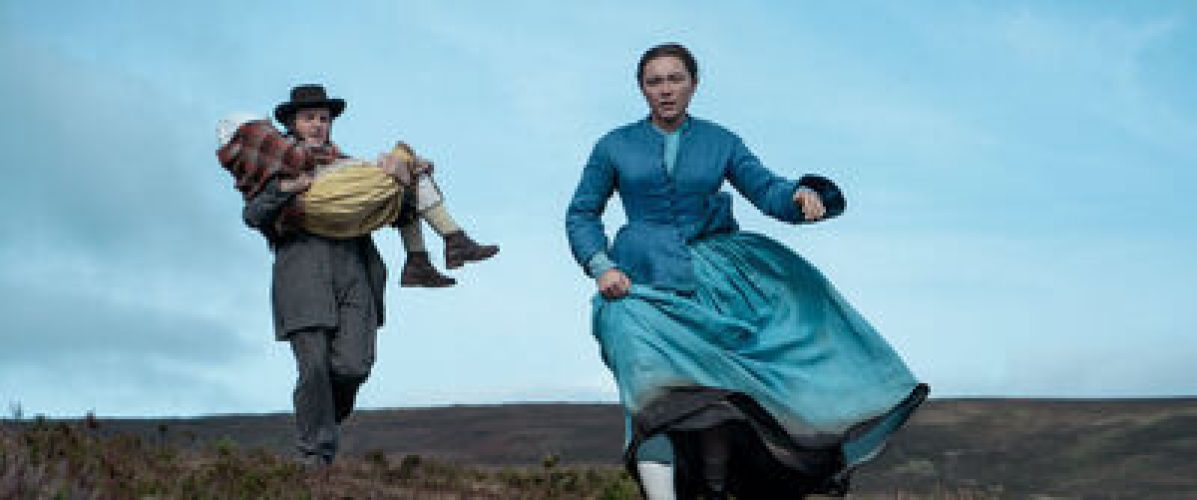“We are nothing without stories, and so we invite you to believe in this one.” Sebastian Lelio’s fascinating “The Wonder” opens with a prologue that includes this line, one that’s crucial to unpacking the film that follows. Working with co-writers Alice Birch & Emma Donoghue to adapt Donoghue’s own novel, Lelio doesn’t just want you to passively watch the story of what’s to come. It’s not an invitation to hear or see this story, but to believe in this one. And that’s an important distinction. We aren’t just being asked to question the circumstances of what’s to come or even what we would do in the same situation, but to believe in what we’re watching. Lelio is less concerned about the practical truths and lies of “The Wonder” than he is what they mean, what they say about humanity, and how they interrogate what we believe.
Pugh plays Lib Wright, an English nurse in the year 1862, a year when the mass famine of the 1840s has left scars across the Irish landscape to which she travels. She has been summoned there by a committee looking for answers about a local girl who appears to be a miracle—one that includes arguably underwritten characters played by Toby Jones, Ciaran Hinds, and Brian F. O’Byrne. Nine-year-old Anna O’Donnell (the excellent Kila Lord Cassidy) has not eaten in four months. She claims to subsist only on manna from heaven, and her survival has led to worshippers who want to confer with this potential saint. Her mother Rosaleen (Cassidy’s actual mother Elaine) insists that there is no trickery here, but Lib’s job will be to watch Anna to see if food is somehow being snuck into her bedroom. A journalist named William (Tom Burke) has also traveled there to fuel Lib’s skepticism, and it’s no coincidence that both the writer and the nurse have brought the grief of loss in their baggage.
Lib is constantly being told, “You are only here to watch.” She is the observer, just like us. There are fascinating bookends to this story that arguably reach too far in terms of form but it’s interesting to see a piece that’s about faith and skepticism in equal measure be so directly confrontational with its audience. Naturally, Lib’s instinct begins where most viewers would—doubtful that Anna isn’t eating and then increasingly concerned about her declining physical state. Pugh takes us on the journey with her from skepticism to concern and “The Wonder” becomes a study in empathy and action. How long can we be expected to just “watch” when the life of a child is in danger? How long can we stay inactive when faith is destructive enough to tear communities and families apart?
A drama this ambitious demands a fearless performer like Pugh, who knows exactly the tightrope to walk when it comes to the story’s delicate balance between realism and melodrama. Pugh can’t push the throttle too far into the emotional or risk turning “The Wonder” into a more traditional melodrama, the kind of thing that’s easier to place in a box and walk away. Lelio doesn’t want that. He wants viewers to feel as unsettled as Lib, who becomes increasingly unmoored as she realizes she has either been asked to bear witness to a miracle or the death of a child. Lib’s uncertainty is enhanced by an excellent score by Lelio’s regular composer Matthew Herbert that avoids the lilt common to period pieces in favor of something more uncomfortable. And the phenomenal Ari Wegner (“The Power of the Dog”) shoots the film with a gloomy, gray palette that almost makes it feel like a horror flick.
There are times when Lelio feels a bit unsure of his own ambition, falling back on a more traditional pace and rhythm, but he always gets back to the more interesting version of “The Wonder” that ultimately comes together. It also feels like Burke’s journalist character is woefully underwritten, a part that feels almost like a plot device here instead of a rich counterpart to Lib. He’s not bad but feels a bit stuck in terms of character in a way that can be frustrating. Burke is always an intriguing performer, but this film actually falters a bit when he’s around as if he’s invading the space between Anna and Lib instead of enhancing it.
Even if its questions of faith don’t intrigue Netflix subscribers, the performances will. Lelio has proven himself to be a consistently phenomenal director of actresses, drawing great work from Daniela Vega (“A Fantastic Woman”), Julianne Moore (“Gloria Bell”), and Rachel McAdams (“Disobedience”). We can now add Pugh (and Cassidy really) to that list as another woman who is consistently asked by the men of this film to step aside and merely observe. She starts off merely watching, but she ends the film with a different kind of resolve, one that comes from her unshakeable belief.
In limited theatrical release today and on Netflix on November 16th.
“We are nothing without stories, and so we invite you to believe in this one.” Sebastian Lelio’s fascinating “The Wonder” opens with a prologue that includes this line, one that’s crucial to unpacking the film that follows. Working with co-writers Alice Birch & Emma Donoghue to adapt Donoghue’s own novel, Lelio doesn’t just want you to passively watch the story of what’s to come. It’s not an invitation to hear or see this story, but to believe in this one. And that’s an important distinction. We aren’t just being asked to question the circumstances of what’s to come or even what we would do in the same situation, but to believe in what we’re watching. Lelio is less concerned about the practical truths and lies of “The Wonder” than he is what they mean, what they say about humanity, and how they interrogate what we believe. Pugh plays Lib Wright, an English nurse in the year 1862, a year when the mass famine of the 1840s has left scars across the Irish landscape to which she travels. She has been summoned there by a committee looking for answers about a local girl who appears to be a miracle—one that includes arguably underwritten characters played by Toby Jones, Ciaran Hinds, and Brian F. O’Byrne. Nine-year-old Anna O’Donnell (the excellent Kila Lord Cassidy) has not eaten in four months. She claims to subsist only on manna from heaven, and her survival has led to worshippers who want to confer with this potential saint. Her mother Rosaleen (Cassidy’s actual mother Elaine) insists that there is no trickery here, but Lib’s job will be to watch Anna to see if food is somehow being snuck into her bedroom. A journalist named William (Tom Burke) has also traveled there to fuel Lib’s skepticism, and it’s no coincidence that both the writer and the nurse have brought the grief of loss in their baggage. Lib is constantly being told, “You are only here to watch.” She is the observer, just like us. There are fascinating bookends to this story that arguably reach too far in terms of form but it’s interesting to see a piece that’s about faith and skepticism in equal measure be so directly confrontational with its audience. Naturally, Lib’s instinct begins where most viewers would—doubtful that Anna isn’t eating and then increasingly concerned about her declining physical state. Pugh takes us on the journey with her from skepticism to concern and “The Wonder” becomes a study in empathy and action. How long can we be expected to just “watch” when the life of a child is in danger? How long can we stay inactive when faith is destructive enough to tear communities and families apart? A drama this ambitious demands a fearless performer like Pugh, who knows exactly the tightrope to walk when it comes to the story’s delicate balance between realism and melodrama. Pugh can’t push the throttle too far into the emotional or risk turning “The Wonder” into a more traditional melodrama, the kind of thing that’s easier to place in a box and walk away. Lelio doesn’t want that. He wants viewers to feel as unsettled as Lib, who becomes increasingly unmoored as she realizes she has either been asked to bear witness to a miracle or the death of a child. Lib’s uncertainty is enhanced by an excellent score by Lelio’s regular composer Matthew Herbert that avoids the lilt common to period pieces in favor of something more uncomfortable. And the phenomenal Ari Wegner (“The Power of the Dog”) shoots the film with a gloomy, gray palette that almost makes it feel like a horror flick. There are times when Lelio feels a bit unsure of his own ambition, falling back on a more traditional pace and rhythm, but he always gets back to the more interesting version of “The Wonder” that ultimately comes together. It also feels like Burke’s journalist character is woefully underwritten, a part that feels almost like a plot device here instead of a rich counterpart to Lib. He’s not bad but feels a bit stuck in terms of character in a way that can be frustrating. Burke is always an intriguing performer, but this film actually falters a bit when he’s around as if he’s invading the space between Anna and Lib instead of enhancing it. Even if its questions of faith don’t intrigue Netflix subscribers, the performances will. Lelio has proven himself to be a consistently phenomenal director of actresses, drawing great work from Daniela Vega (“A Fantastic Woman”), Julianne Moore (“Gloria Bell”), and Rachel McAdams (“Disobedience”). We can now add Pugh (and Cassidy really) to that list as another woman who is consistently asked by the men of this film to step aside and merely observe. She starts off merely watching, but she ends the film with a different kind of resolve, one that comes from her unshakeable belief. In limited theatrical release today and on Netflix on November 16th. Read More


